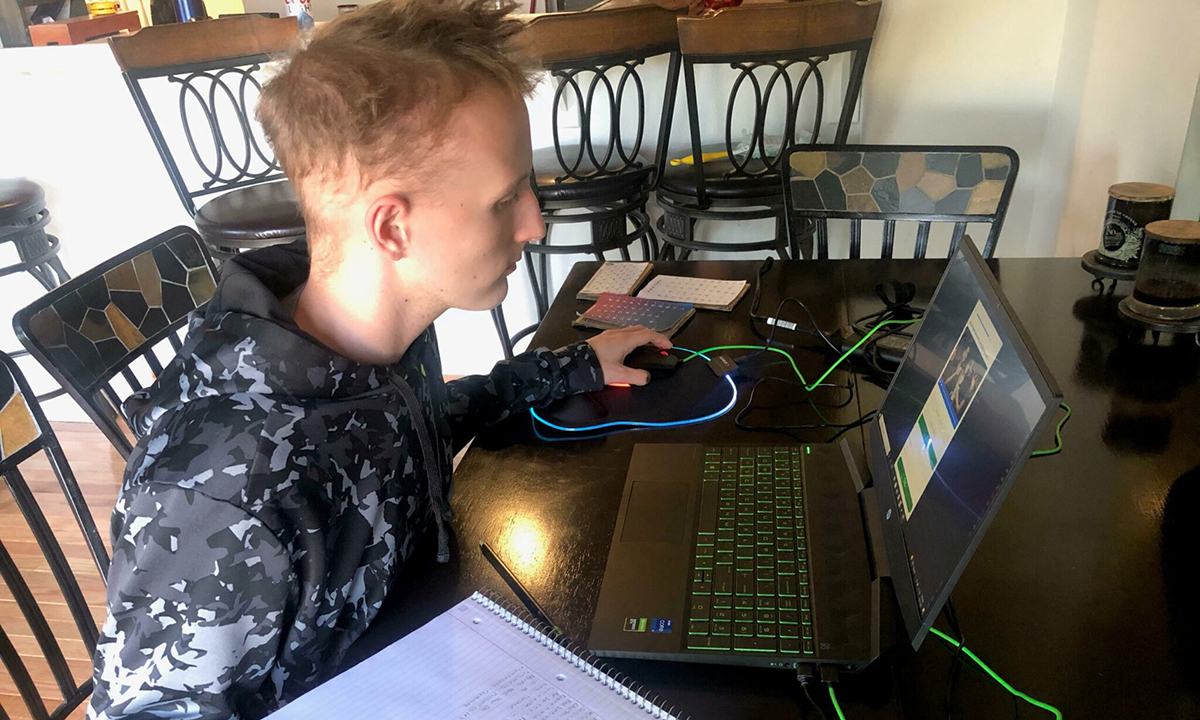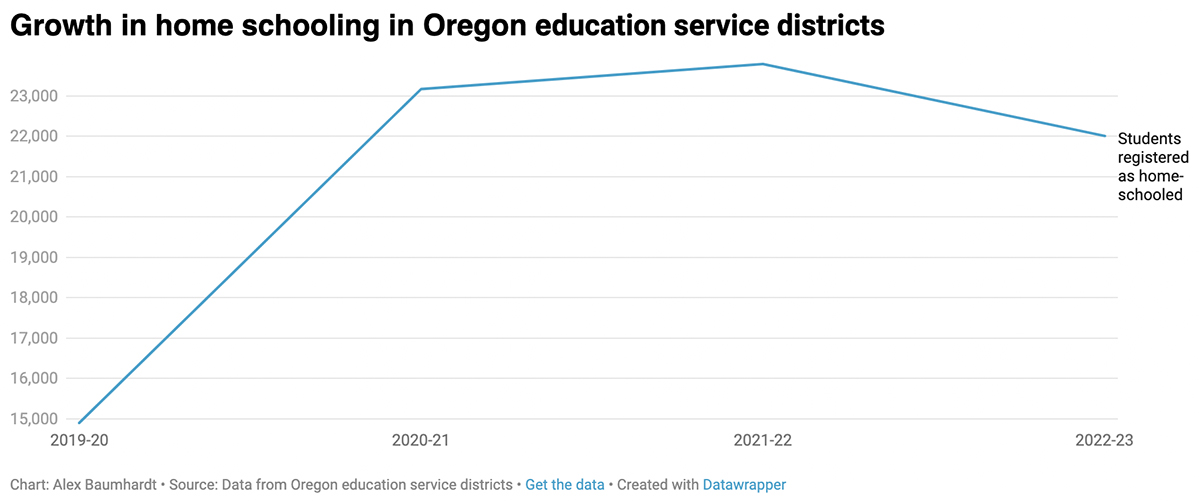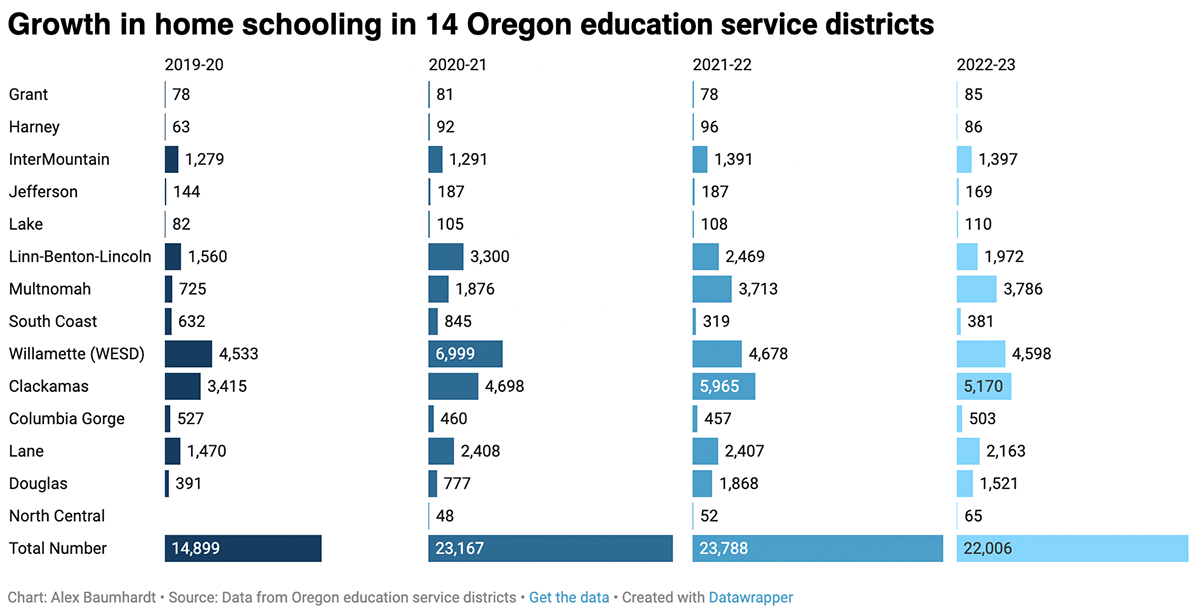Oregon’s Home-Schooling Surge During Pandemic Starting to Cool
Home-school enrollment declined slightly this year, bit is still about 40% higher today than it was in 2019 before the pandemic

Get stories like this delivered straight to your inbox. Sign up for The 74 Newsletter
Oregon’s pandemic home-schooling boom is beginning to cool off, new state data shows.
The number of students taught at home this year is down about 7.5% from last year in 14 of the state’s 19 Education Service Districts that responded to Capital Chronicle data requests and that track total home-school enrollment at the beginning of the school year. Parents who choose to home-school their kids must report their intent to do so with one of the state’s 19 regional districts, which cover all 197 school districts in the state. The service districts coordinate certain services and resources that are more cost-effective to share between multiple districts.
Home-school enrollment among those districts is still about 40% higher today than it was in 2019, before the pandemic moved classes online for over a year.
Parents don’t have to report why they are choosing to home school when they register, but Rosalyn Newhouse, a volunteer with the Oregon Homeschool Education Network, said many members of the group’s Facebook page have discussed why they haven’t sent their kids back to school.
“People who became involuntary home-schoolers during the pandemic said, ‘Wow, I didn’t realize my kid was under so much stress,’” Newhouse said. “A lot of parents are saying, ‘Actually, this has worked out really well for us and we’re going to stick with it.’”

Between 2019 and 2020, the number of students registering for home schooling in Oregon shot up about 71%, from just over 18,000 to more than 31,000.
It was part of a nationwide trend. Between the spring of 2019 and the fall of 2020, the number of students registered for home schooling across the country doubled, according to the U.S. Census Bureau. Among Black and African American students, the number taught at home quintupled.
Data from 18 states analyzed recently by The Associated Press shows a slight decline in home-schooled numbers since the pandemic, about 17%, but not a return to pre-pandemic levels.
In six of the 14 districts the Capital Chronicle reviewed, the number of home-schoolers is still up 30% or more from pre-pandemic levels. In two districts — the Columbia Gorge and South Coast — the number enrolled today has sunk below pre-pandemic levels.
In Oregon, the numbers have increased the most in the most populous districts.
In the Multnomah Educational Service District, which oversees Centennial, David Douglas, Parkrose, Corbett, Gresham-Barlow, Portland Public and the Riverdale school districts, the number of home-schoolers is up about 2% this year, and remains up about 422% from pre-pandemic levels.

In 2019, 725 students in the Multnomah district were enrolled in home school. Today, about 3,800 are — nearly 4% of the district’s estimated 100,000 students.
Newhouse said the numbers tend to be highest in counties such as Washington and Multnomah where parents have more resources for home schooling.
“Where the populations are larger, there are more opportunities to hook up with other home-schoolers, so it’s easier to form a community,” she said.
Home-schooled students still make up a relatively small portion of the overall student population in the state. Even with the boom in 2020, the number enrolled in home schooling was about 5% of the state’s total student population.
Home schooling in Oregon involves little oversight. The Oregon Department of Education recommends content standards and a framework for teaching at home on its website, but parents aren’t required to use it. Students need test for comprehension in major subject areas at grades three, five, eight, and 10. When it comes to earning a diploma at graduation, it’s up to local high schools to decide whether to award one.
Oregon Capital Chronicle is part of States Newsroom, a network of news bureaus supported by grants and a coalition of donors as a 501c(3) public charity. Oregon Capital Chronicle maintains editorial independence. Contact Editor Lynne Terry for questions: info@oregoncapitalchronicle.com. Follow Oregon Capital Chronicle on Facebook and Twitter.
Get stories like these delivered straight to your inbox. Sign up for The 74 Newsletter

;)